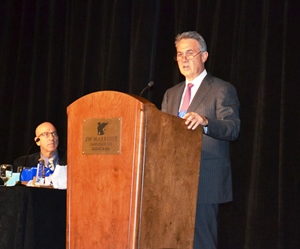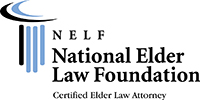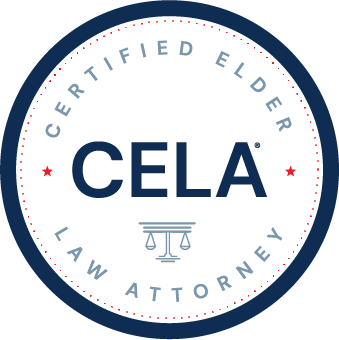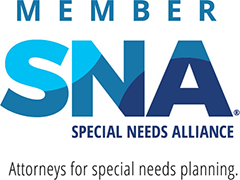Why do I need a Guardianship?
Firm News
A few months ago, I met with a family with the following set of circumstances; Sue, the mother, has cancer; Jim, the father, is employed; one son, Steve, is 17 with autism in addition to other special needs who does not receive public benefits; the other son, Bruce, is a college graduate and works in a neighboring town. Sue’s father recently died and left Steve $45,000 worth of bank stock. There are a variety of issues that must be addressed with this family.
A reversion is a power to reclaim possession or enjoyment of the trust property. If at the creation of the trust, the value of the reversion exceeds 5% of the value of the trust portion to which the reversion relates, the grantor is treated as the owner of that portion of the trust. To determine whether the value of the reversion exceeds the 5% threshold, the value of the reversion is compared to the value of the transferred property, including those interests not dependent upon surviving the grantor. The reversion test is met whether the grantor retained a reversion that is expressly stated in the document or occurs by operation of law.
Section 673 provides as follows:
“The grantor will be treated as the owner of a trust or any portion of the trust in which the grantor has a reversionary interest in either the corpus or the income there from, if, as of the creation of the trust (or such portion), the value of such interest exceeds 5% of the value of the trust (or such portion).”
For § 673 to apply there must be a reversionary interest to the grantor. Actuarial rules under § 2031 are used to value the reversion. For example: T creates a trust for 50 years for A. After 50 years, the trust then terminates and reverts to the grantor T. If the applicable § 7520 interest rate is 1.4% at the time the trust is created, the value of the reversion is 49.9%. Since the value of the reversionary interest exceeds 5%, T would be treated as the grantor under § 673.
Section 673(c) is a valuation subsection to the general rule stated in 673(a). In other words, 673(c) does not create an additional category of rules to make a trust a grantor trust, it is an instruction on how the reversionary interest must be valued.
673(c) Special Rule For Determining Value Of Reversionary Interest
“For purposes of subsection (a), the value of the grantor's reversionary interest shall be determined by assuming the maximum exercise of discretion in favor of the grantor”
For example, a grantor funds a discretionary trust for the benefit of his children to last for 20 years. At the expiration of the 20 year period, the trust fund is to revert to the grantor. In determining whether the trust is a grantor trust under 673(a), the value of the grantors reversionary interest at the inception of the trust needs to be determined by assuming the maximum exercise of discretion in favor of the grantor. This means that in determining the value of the grantor’s reversionary interest, 673 (c) requires an assumption that no distributions are made to the grantor’s children during the trust’s 20 year term
A well drafted first party snt trust will require the trustee to exercise maximum discretion in favor of the beneficiary. The trust document must also provide that the grantor (beneficiary) cannot compel the trustee to make any distributions to or for the benefit of the grantor (beneficiary). If the document provided otherwise, it would not be a valid first party snt. The exercise of maximum discretion for the benefit of the grantor (beneficiary) is not a reversionary interest as contemplated under § 673(a). If there is no reversionary interest as defined in § 673(a), § 673(c) does not apply. Section 673(c) does not impose grantor tax status to a discretionary trust where no reversionary interest exists in the first place.
Click here to read the NAELA article entitled "NAELA Commends House Passage of Older Americans Act Reauthorization Act."
Douglas had to place his mother in a nursing home. Douglas consulted a social worker who told him that he should spend his mother’s assets down to below $2,000 and then, for a small fee, the social worker would prepare the Medicaid application for his mother and everything would be taken care of.
Douglas spent his mother’s assets below $2,000, paid the social worker $2,500 to prepare the Medicaid application and was told everything was good to go with his mother.
After about four months, Douglas had not heard anything on the status of the Medicaid application and the business office at the nursing home told him that his mother’s account was $35,000 past due. After a few frantic calls to the social worker, Douglas found out that his mother’s Medicaid application was rejected by the Medicaid office because of some prior gifts his mother had made to set up college funds for Douglas’ three children.
Because the Medicaid application was rejected, the nursing home is demanding that Douglas immediately pay the $35,000 past due account or the nursing home will evict his mother. Additionally, the nursing home is telling Douglas that he is personally liable for the payment of the bill because he signed as the “responsible party” at the time his mother was admitted to the nursing home.
Fortunately, we were able to reverse the decision by the Medicaid office on appeal and qualify Douglas’ mother for Medicaid. Douglas would have saved himself a lot of money and stress if he would have consulted with an elder law attorney with expertise in protecting assets from long term care costs this office first and retained them to complete the Medicaid application correctly. I explained that it is almost never in the best interest of the Medicaid applicant to spend down all of their money. There are legal ways to protect a person’s savings if it is done correctly.
The filing of a Medicaid application is a complicated process. There is no room for mistakes.
It can be an honor and a burden to be appointed trustee of a trust. What responsibilities have been thrust upon you? How do you successfully carry them out?
Brad is quoted in a MarketWatch article entitled, "Caring for Older People's Finances can Boost Independence," dated May 21, 2015. To read this article, click here.
Brad is quoted in an article entitled "Long Term Care Insurance: It's Not for Everyone." Please click here to read this article.
Brad is quoted in an article entitled "Navigating the Complexity of a Long Term Care Insuarnce Policy. Click here to read this article.
The recent case of Clark v. Rameker, 134 S. Ct. 2242 (2014), the U.S. Supreme Court unanimously ruled that inherited IRAs do not qualify for the bankruptcy exemption afforded to a debtor's own retirement accounts. Heidi Clark and her husband filed for Chapter 7 bankruptcy and claimed an IRA that Heidi had inherited from her mother as exempt. Originally, the Wisconsin Bankruptcy Court ruled that Ms. Clark’s inherited IRA was not exempt as a retirement account. After winding through federal district court and the Seventh Circuit Court of Appeals, the U.S. Supreme Court heard the case. The Court unanimously ruled that inherited IRAs do not qualify for the bankruptcy exemption afforded to a debtor's own retirement accounts. The Court’s ruling was based on three factors differentiating between an inherited IRA and a beneficiary’s own IRA:
1. The beneficiary of an inherited IRA cannot make additional contributions to the account. An IRA owner, however, can make additional contributions to the account.
2. The beneficiary of an inherited IRA must take required minimum distributions from the account regardless of how old the beneficiary is. An IRA owner, however, can defer distributions at least until age 70 1/2.
3. The beneficiary of an inherited IRA can withdraw all funds anytime, for any reason, without a penalty. An IRA owner must generally wait until age 59 1/2 to take distributions without incurring penalties.
Brad is quoted in an article in MarketWatch entitled, "Who's Getting the Beach House? Tell Your Heirs Now." Click here to read this article.
Brad is quoted in a recent CNN Money/Genworth article entitled, "The Biggest Threat to Retirement Planning." Click here to read this article.
Brad participated on a panel, "Legalized Marijuana Update," at the annual Conference of Western Attorney Generals held in Park City, Utah in July 2014. Participants in the panel included: John Suthers, Colorado Attorney General; Bruce Turcott, Washington Assistant Attorney General; David Blake, Colorado Deputy Attorney General and Tim Cullen, Parter OpenVAPE.
Brad is quoted in a recent Market Wealth article entitled "How a Parent's Health-Care Bills Could Hurt You." Click here to read this article.
GAO released its report on long term care reform. It's a starting point. Click here to read the report.
To investigate a nursing home for a loved one, you may contact the local Ombudsman program to identify facilities that can meet your needs. It is a free consumer advocacy program.
Brad was recently on Dr. Sam Brinkman's "Neuro Matters Radio Show. Please use this link to listen to this interesting show. http://cdn.voiceamerica.com/health/011384/brinkman060314.mp3

Washington, DC – The National Academy of Elder Law Attorneys (NAELA), an association of attorneys dedicated to improving the quality of legal services provided to older Americans and individuals with special needs, is proud to announce its appointment of Bradley J. Frigon, CELA, CAP, of Englewood, Colo., as President of the 2014-2015 Board of Directors. Frigon will begin serving as NAELA President on June 1, 2014.
Recent Social Security Administration (SSA) rules have the potential to impact the validity and administration of special needs trusts. This article addresses important implications of paying for third party travel and paying third parties for goods and services with the funds of a special needs trust.












